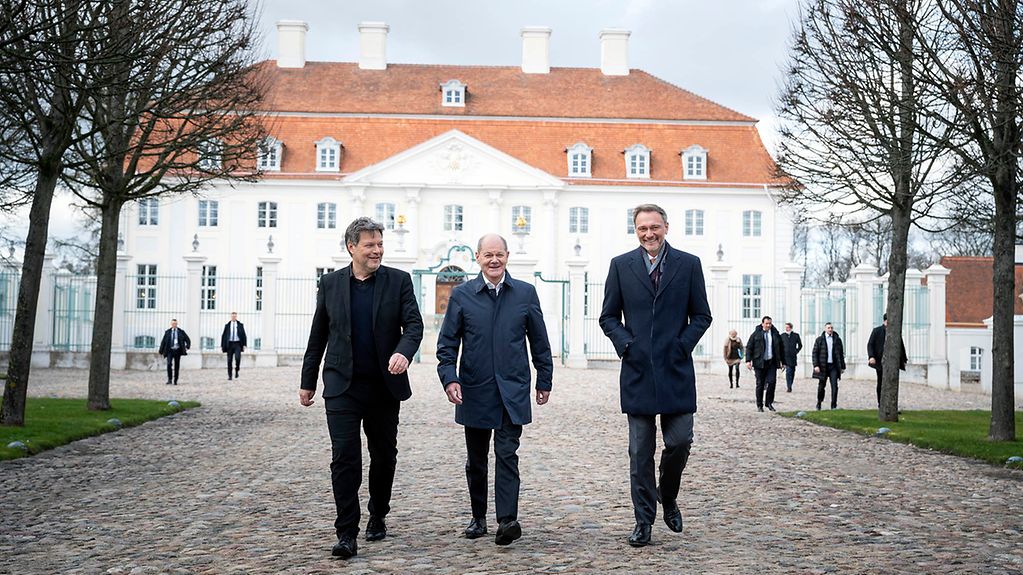Federal Cabinet retreat
During its closed-door meeting in Meseberg, the Federal Government discussed questions concerning the future of the country at length. As Federal Chancellor Scholz explained, the Federal Cabinet wants to build upon the momentum of the first year in order to "tackle the task that will be our primary concern going forward, namely the transformation of the economy towards climate neutrality".
4 min reading time

Federal Chancellor Scholz (centre) with Federal Minister for Economic Affairs and Climate Action Habeck (left) and Federal Minister of Finance Lindner: "We must and wish to dare to make greater progress."
Photo: Federal Government/Bergmann
Germany's economic prospects in the new era, greater speed in the energy transition, data policy, and artificial intelligence: the Federal Cabinet gathered for a two-day closed-door meeting to discuss issues that go beyond the here and now. According to Federal Chancellor Olaf Scholz, speaking after the consultations at Schloss Meseberg, the Federal Government's guest house in Brandenburg: "We have achieved a great deal in our first year in office in terms of steering our country safely through the crisis created by Russia's invasion of Ukraine."
Germany, he said, was providing Ukraine with political, humanitarian, and financial support, as well as with weapons. At the same time, he continued, Germany had freed itself from its dependence on Russian energy supplies and had raised immense sums to cushion the high energy prices and avert an economic crisis.
"Momentum for our country"
"We have succeeded in this," said Federal Chancellor Scholz, "and this has generated momentum for our country." The Federal Government, he said, wants to build upon the momentum of the first year and apply it to the task that will be its primary concern, going forward, i.e., the transformation of the economy towards climate neutrality and digitalisation, which will ultimately result in an economic upswing. The aim, he said, was for the German economy to remain competitive in the coming decades, with good jobs, and to meet the challenge of a carbon-neutral economy. It had become clear during the talks in Meseberg, he said, that this would succeed and that there was every reason for optimism.
Upgrading electrical grids – progress through electromobility
At the same time, the Federal Chancellor added, the task should not be underestimated: Germany wants to be completely climate-neutral in just 22 years’ time. That, he said, would require the construction of four to five new wind turbines per day and the equivalent of over 40 football pitches worth of solar panels by 2030. Germany would have to upgrade the grid, invest in the hydrogen economy, and make progress in the field of electromobility.
In an excellent position to meet the challenges
Towards the end of the Federal Cabinet retreat, Federal Minister for Economic Affairs and Climate Action Robert Habeck emphasised the fact that: "When it comes to transformation, we are facing some major challenges." With regard to the expansion of renewable energies in particular, he went on to say that Germany had every opportunity to meet the major challenges through economies of scale, technical potential, and digitalisation.
"It was a good Federal Cabinet retreat," said Federal Minister of Finance Christian Lindner adding that what had become clear in Meseberg, both with regard to the energy transition and to artificial intelligence, was the enormous need for capital investment in these areas. "What matters above all is private capital, not just the necessary resources from the state." Which is why, according to Lindner, the Future Financing Act should be concluded quickly in order to improve conditions for private funding.
Visit of the President of the EU Commission
Germany's competitiveness is closely linked to that of the rest of Europe. At the beginning of their closed-door meeting on Sunday, the Cabinet members discussed with the President of the EU Commission, Ursula von der Leyen, how this could be secured in the long term. They also discussed what role Europe might play as a sovereign EU and geopolitical power. There are extremely close ties between Germany and the rest of Europe, said Federal Chancellor Scholz – and rightly so, because "we can only succeed in the future by working together."
Support for Ukraine: Europe stands together
Of course, said Scholz, no consultation was possible without also discussing the Russian offensive against Ukraine. "The fact that we are standing together here," he said, "and that we have remained united, is something that Russia, that the Russian President, certainly never expected." The willingness to continue to support Ukraine in defending its state integrity, democracy, the rule of law and freedom, he said, was unwavering.
Artificial intelligence offers enormous opportunities
The Federal Government also discussed other topics in Meseberg where guests provided input on such topics as artificial intelligence, which, according to the Federal Chancellor, entails enormous opportunities for the energy sector, mobility, and medical research. "Our discussions here in Meseberg have once again made clear what we now need to do: we must and wish to dare to make greater progress. We need to move faster and be confident and optimistic."
The Government Monitor: Keep abreast of the implementation of important Federal Government measures via the Government Monitor. See for yourself what the Federal Government is currently working on, what the Federal Cabinet has already decided, and which laws have already come into force. The Government Monitor is updated once a month.